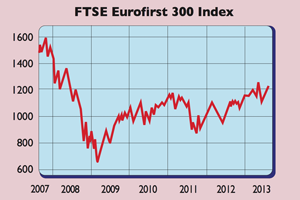
“The eurozone is doing surprisingly well,” says Richard Barley in The Wall Street Journal. The second quarter’s GDP growth figure – of 0.3%-1.1% annualised – beat expectations and ended 18 months of recession. Recent business surveys suggest the positive momentum will continue.
Solid economic data and falling bond yields (in other words, falling borrowing costs) in the debt-soaked ‘peripheral’ countries have boosted sentiment. The pan-European FTSE Eurofirst 300 stock index has jumped 10% since late June. Spanish and Italian stocks are up 15%. Europe has outperformed America too of late, as its equity markets are more cyclical “and more exposed to low-quality financials”, says Robert Farago of Schroders.
Will the bounce last?
On the other hand, says Farago, in cyclical markets “you are less protected when things go wrong”. And there is plenty of scope for markets to stumble or slide. Europe is finally out of recession, but a rapid bounce is not on the cards. One cloud on the horizon is the prospect of higher long-term interest rates, or bond yields, as investors increasingly factor in a gradual tightening of monetary policy in the US. As global rates are priced off US ones, an uptick in Treasury yields tends to bolster yields elsewhere – witness last week’s rise in bond yields and turbulence in equity markets worldwide.
More significant, however, is “the huge cargo tethered to the currency bloc’s rear bumper”, as Matthew Dalton puts it in The Wall Street Journal – the “trillions of euros of private-sector debt” that Europe “has done little to address”. The US appears to have managed to work off or write down enough of its debt to allow the private sector to start expanding again. But in many European countries consumers and companies remain weighed down by borrowings piled up in the boom years. Spain, Portugal, Ireland and Cyprus look especially vulnerable in this regard, according to the European Commission.
But “Europe’s main problem remains its banking system”, says the Financial Times. Damaged balance sheets are stopping banks from making loans and so are choking off growth. Unlike in the US, banks haven’t yet owned up to the full extent of their crisis-related losses, and still need more money to guard against potential future problems. The credit squeeze won’t end in a hurry.
To meet stricter rules on capital and leverage, banks will have to reduce their balance sheets by over €3trn over the next five years, reckons the Royal Bank of Scotland (RBS). Banks could raise capital to meet the new rules, but only the big ones are likely to be able to do so; investors will deem the rest too risky. That means they must reduce their assets to become safer. That implies less lending, especially in the south, where smaller banks predominate.
Meanwhile, European policy makers are keeping quiet until after the German elections, notes Wirtschaftswoche. But with Greece and Portugal widely deemed likely to need more aid or debt relief, the crisis looks set to flare up again before too long. Political patience with austerity looks exhausted in the periphery, says Michael Diekmann of Allianz. That makes the situation all the more unpredictable. Therefore, it’s not hard to see economic confidence, and hence stocks, taking a knock as politics moves centre stage again.
A solid long-term bet
So the immediate outlook for European equities is not especially appealing. But they remain a solid long-term bet. Enough of the potential hazards are reflected in valuations to make stocks attractive, while in a major crisis the European Central Bank would print money to reduce bond yields, which bodes well for stocks. Morgan Stanley, highlighting data going back to 1979, notes that Europe has never been this cheap, compared to the US, in terms of the cyclically adjusted price/earnings ratio (CAPE). Italy’s CAPE is just seven, a level that promises healthy long-term returns. Investors can play this via the iShares FTSE MIB (LSE: IMIB).